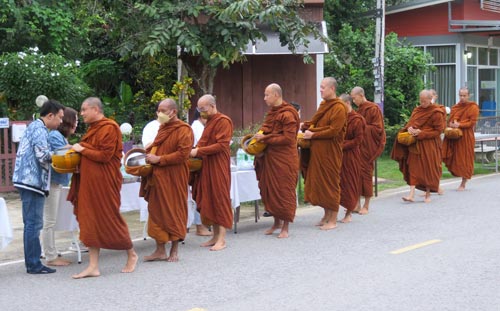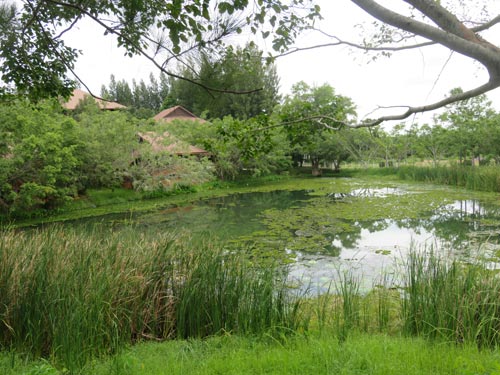Finding spirituality in a serene setting

The monks on pindapatha at the village and below, the monastery's tranquil landscape
As an evening chill descended upon the ground, a nightjar couple commenced a conversation somewhere in the wilderness.
Then, the temple bell began to toll.
Monks in saffron robes and laypeople in lily white emerged from the thickets encircling the impressive assembly hall of the monastery. Their sedate tread in one direction in fading light with eyes riveted to the ground brought on goosebumps for the first timer in me.
The evening session of chanting of Pali suttas and meditation had begun at the Wat Subtawee Dhammaram of Thailand. This enchanting forest monastery is located at the foothills of Khao Yai National Park in the region of Wang Nam Khio in Nakhon Ratchasima province. The National Park is a lush mountain range where wild elephants and bison roam.
The Chief Incumbent of Wat Subtawee Dhammaram is Ajahn Ganha who is known in the Kingdom of Thailand as Luang Poh (Holy Father). Ajahn Ganha is the nephew of the great noble monk Ajahn Chah. Luang Poh is the founder and the architect of the monastery which he established two decades ago. Now in his mid-seventies, he is said to have practised meditation in the tropical forests of Thailand for over 30 years. Devotees and explorers of Dhamma from various parts of the world visit Wat Subtawee Dhammaram to pay homage to the monk and receive not only his blessings but sage advice on their practice.
 As I came to understand, his teaching methods are quite simple to follow: he mostly emphasises being happy in the present moment. An audience with Ajahn Ganha is always a fascinating spiritual adventure as he teaches lay people how to focus on basic meditation at home before trying any advanced technique. He also reiterates being selfless; how to let go of self which is the platform to practise renunciation. The third point he stresses is understanding the concept of non-self (anatta) which is the pathway to shed ego. In these three vital components lie the key to spiritual development.
As I came to understand, his teaching methods are quite simple to follow: he mostly emphasises being happy in the present moment. An audience with Ajahn Ganha is always a fascinating spiritual adventure as he teaches lay people how to focus on basic meditation at home before trying any advanced technique. He also reiterates being selfless; how to let go of self which is the platform to practise renunciation. The third point he stresses is understanding the concept of non-self (anatta) which is the pathway to shed ego. In these three vital components lie the key to spiritual development.
Life in the monastery kicks off at 3 a.m. when the gong sounds for the morning programme of chanting to begin followed by a meditation session. Devotees and monks leave their ‘kuti’ and walk through the groves, towards the hall along neatly appointed paths flashing their torches.
Hardcover volumes with English translations of the suttas are available to follow the intonations in Siamese by the monks. At 6.30 a.m. they visit the village nearby on foot to participate in the ‘pindapatha’.
Monks of the monastery follow the mendicant order of forest monks and line up each morning at the village to receive alms. One can prebook rice, curries, salads, or desserts from households by the side of the road who seem to have dedicated their lifestyles to suit the needs of the monastery.
At 7.30 a.m. devotees have an audience with Luang Poh who blesses the crowd and preaches words of wisdom. A professional translator would translate the sermon to English for the benefit of the foreigners. A dhamma talk follows in the hall at 8 a.m. (not in English, and after ‘pindapatha’, the monks arrive at the refectory by 8.30 a.m. to consume their only meal for the day.
The laypeople line up thereafter, usually by 9.30 a.m. for brunch. From 10.30 a.m. to 3 p.m. it is free time for individual activities or to help the monastery staff with cleaning up, sweeping the paths etc which is essential Dhamma seva for the upkeep of the premises. By 3 p.m. the devotees will once again reach the hall for meditation and the evening chanting ceremony takes place from 6.30 p.m. to 7.30 p.m. Thereafter, monks and devotees both engage in meditation until 8.30 p.m. at which time the programme for the day ends.
Wat Subtawee Dhammaram is one with nature. Its vast terrain is landscaped with breathtaking forest cover hugging lakes where wild and birdlife thrive. The peace and tranquility at the monastery soothe the eye as well as the mind and make the task at hand of a forest monk easier to fulfil. Similarly, the mind of a devotee, freed from the tribulations of life, begins to shed layers of toxins collected over the years. It is that serene prospect that lets the first seed of impermanence germinate in a novice mind. The mind is then set in motion to draw parallels and visualise a life in robes under a well spread-out tree.
The best time to visit the monastery is from November to May before the rainy season sets in. On a pre-arrangement with the monastery, a kuti can be reserved for any number of days but they expect you to stay at least a week to get the best results. Night temperatures can drop down to 15 C, so visitors are advised to bring some warm clothing. Rooms have all basic amenities including blankets and hot water in addition to a central pantry per structure which usually has four kutis built at two elevations. There is no charge involved but donations for upkeep can be made to the office. Since there is no regular public transport service to the region, the monastery officials arrange transport at a reasonable cost either from the city or from the Airport.
As in most forest monasteries, all at Wat Subtawee Dhammaram consume only one meal a day. They also do not encourage the use of caffeine. Bottled water is freely available instead.
Wat Subtawee Dhammaram is a four-hour drive from the city of Bangkok or Suvarnabhumi Airport.
If one is lucky, one gets an invitation to have a dhamma discussion with Luang Poh in the early afternoons or evenings. Usually, foreigners get this opportunity and the chance to raise questions about their practice. Astonishingly, often Ajahn knows what the questioner is about to ask before they utter a word! His expressions radiate utmost loving-kindness and he always has a word of gratitude for Sri Lanka if he notices any Sri Lankans among the visitors, for he says the purified version of the Theravada doctrine which is in practice in Thailand at present was brought from Sri Lanka 700 years ago and therefore, the Kingdom owes a lot to the island nation.
Luang Poh is not without an infectious sense of humour. In answer to a question from a Malaysian devotee about foregoing connectivity to the world, he said with a wry smile, “Your mobile phone is like your wife residing in your pocket!”
Searching for an ideal partner? Find your soul mate on Hitad.lk, Sri Lanka's favourite marriage proposals page. With Hitad.lk matrimonial advertisements you have access to thousands of ads from potential suitors who are looking for someone just like you.


